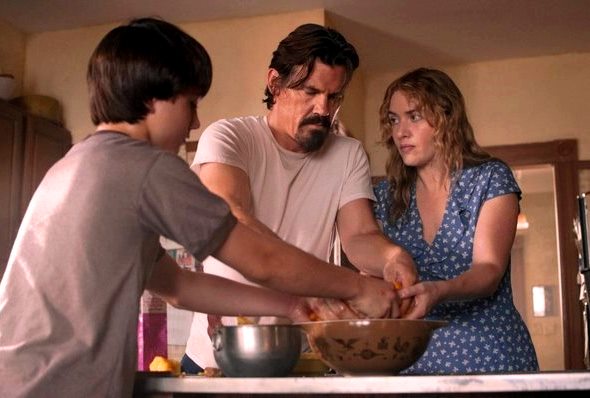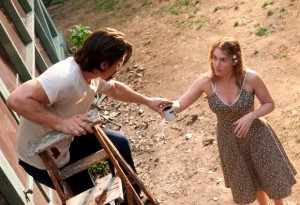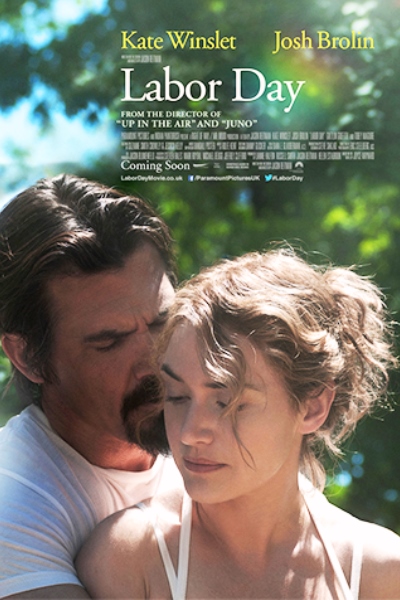
A decent movie that surprisingly made me care, but it’s stacked with too many flaws in the third act. Labor Day is a more arty than you’d expect hostage drama with Josh Brolin as a fugitive and Kate Winslet as an agoraphobic with a son. Winslet’s pushover Adele is so insecure that she takes a liking to Brolin’s jailbreaker Frank after a day, particularly after some peach pie making (it’s better played than it sounds, and mighty delicious-looking). Adele hasn’t been touched in a longtime, which is the core psychological excuse behind the premise. Frank has spent years in prison but still respects women and the values of family. He means no harm, but the television bulletins warn the 1987 community otherwise.
Henry (Gaitlin Griffith, natural actor) is the 13-year old son who has raised his mom more than she’s raised him. He still hangs out with his natural father (Clark Gregg), whom is married to another, but is still aching for a father figure. Frank is the arrival he’s been waiting for in life, and he teaches the boy all resourceful things such as cooking, changing a tire, baseball, and fixing floorboards. The most comparable storyline I’ve seen is “A Perfect World” where Kevin Costner also won over the boy he’s kidnapped by teaching him the ropes on how to be a man.
The interplay between the three main characters is intriguing, and it might even be an effective plot device to have the boy eventually get jealous of Frank stealing his mother’s heart. Does this dangerous predicament of harboring a fugitive worry mom at all? Well, on the upside, she stops feeling so depressed. Adele feels important by even planning Frank’s escape out of town, but this isn’t “The Fugitive” with Harrison Ford. Frank is no action hero. This flick belongs in the mysterious stranger seducing a lonely woman genre. As a fan of this type of melodrama, the movie grips you if you are the gullible, optimistic type (like me during certain movies).
However, “Labor Day” also frustrates us. We get these hazy and nebulous flashbacks of the past that are parceled out like suppressed memories which reveal character secrets, but we don’t know which character is remembering. Or if it’s a character thinking these things at all. It’s more likely movie flashbacks, not character flashbacks, and they tease us by withholding information. Just tell us already, dammit!
 It doesn’t help that the movie has deliberately confusing casting issues. Which characters do the flashbacks seem to be telling us about? The younger early twenties actors both look like Brolin and Winslet, and help me if I thought the movie’s secret was both characters had a past together. Not the case, I ultimately figured out. I was bemused though that the title “Labor Day” turns out to have a double meaning. As for the third act, the duo is too conspicuous such as packing their car in daylight, leaving the door unlocked, not watching Henry’s whereabouts, et cetera.
It doesn’t help that the movie has deliberately confusing casting issues. Which characters do the flashbacks seem to be telling us about? The younger early twenties actors both look like Brolin and Winslet, and help me if I thought the movie’s secret was both characters had a past together. Not the case, I ultimately figured out. I was bemused though that the title “Labor Day” turns out to have a double meaning. As for the third act, the duo is too conspicuous such as packing their car in daylight, leaving the door unlocked, not watching Henry’s whereabouts, et cetera.
I wanted to tell these characters to behave more urgently and cautiously. Still, I was convinced by the characterizations: Brolin’s conversion to father surrogate and by the reasoning behind Winslet’s constant worried and fretful look on her face. “Labor Day” is a departure for director Jason Reitman, whose “Up in the Air” and “Juno” were smart, crackling contemporary comedies. Reitman gives his melodrama “Labor Day” some worthwhile subtext, but he also gratuitously complicates his story.
110 Minutes. Rated PG-13.
ROMANTIC DRAMA / HOSTAGE MOVIE / LAZY AFTERNOON MOVIE
Film Cousins: “The Sugarland Express” (1974); “Desperate Hours” (1990); “A Perfect World” (1993); “Last Ride” (2009, Australia).





